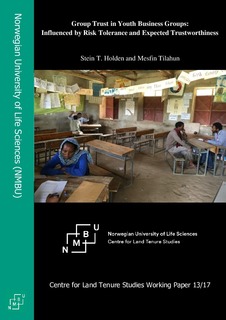Resource information
We analyzed lab-in-the-field trust and risk experiment with 1125 youth in 119 youth groups established as primary cooperatives to develop a joint business. The experiments were implemented using classrooms in local schools as field labs. The standard trust game was used with all youth participants playing the roles as trustors as well as trustees. As trustors, they knew that the trustee would be an anonymous member of their own youth group. We hypothesize that this allows trustors to transform uncertainty about trustworthiness into risk such that risk tolerance will influence trusting behavior. The strategy method was used to elicit more detailed information about stated trustworthiness given different amounts received. A proxy measure for risk tolerance was obtained with a separate simple incentivized risk game. Expected trustworthiness in groups was modeled by the first two moments of the average stated and actual within-group trustworthiness. The group level analysis reveals that higher average risk tolerance increases trust and so does expected trustworthiness measured as average stated trustworthiness. Higher expected risk in the trust game, modeled as within-group variability in actual
trustworthiness, is associated with lower average trust. More risk tolerant groups are also significantly more trustworthy.
NORAD


